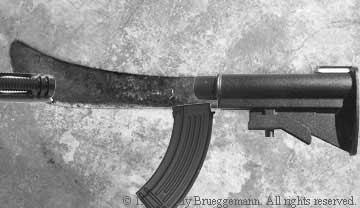|
As a boy growing up in El Salvador, Somerville
pastor Luis Morales said, he was never frightened when
he saw peasant farmers with machetes hanging from their
belts. For rural Salvadorans, the long knife is a basic
and ubiquitous tool, as common as a Swiss Army knife is
here.
Morales, pastor of the Vida Real Evangelical
Center, has watched in dismay as Hispanic street gangs
have transformed the rural implement into an intimidating
urban weapon. Area police say street gangs, whose members
once might have favored switchblades and homemade zip
guns, now prefer the long knives with blades that can
be nearly as thick as an ax and as long as a sword.
"It seems to be that machetes are
the weapon of choice," said Detective Brian Kyes,
spokesman for the Chelsea police. "In the past couple
of years, we've confiscated at least 50 machetes that
have been used in crimes in the city."
 |
| The
recently banned "Assault Machete," with
flash hider, removable magazine and collapsable buttstock.
|
Law enforcement officials say they have
seen a surge in machete attacks, which prompted East Boston
police this spring to revive a little-known city ordinance
banning knives longer than 2.5 inches. Several suburban
communities have enacted similar ordinances to deal with
the sword-like knives.
Police seized a number of machetes, as
well as Chinese throwing stars and a manrikigusari --
a Japanese metal-chain whip -- during a sweep for gang
members in Boston, Chelsea, Lynn, Revere, Everett, and
Somerville last month. Lynn police seize two of the long
knives each month, either from suspects or at crime scenes,
said Mark Richmond, evidence control officer for the Lynn
Police Department.
Machetes, available at corner markets,
garden stores, and on the Internet, are the most prevalent
among the unusual weapons gangs have begun to use. Under
Massachusetts General Law, machetes are legal to carry
in public.
The machete's proliferation has garnered
less police attention and public outcry than recent gun-related
homicides at Boston parks, despite a spate of attacks
that have left at least four Massachusetts men hospitalized
this spring and summer with machete wounds.
Hispanic community leaders and law enforcement
officials said the machete has emerged as the weapon of
choice for gang members in the past three or four years,
a development that has tarnished the machete's centuries-old
reputation as a tool used primarily to cut sugar cane
and clear underbrush.
"For people in El Salvador, the machete
is not looked at as a weapon," said Morales. "Peasants
use it in the fields. It's a way of life."
Members of Boston's Hispanic community
often hang machetes on living room walls as souvenirs
from home or use them for backyard gardening, said Edwin
Argueta, cochairman of the East Boston Latino Community
Coalition.
"It's part of the culture like [Roman
Catholic] crosses and arts and crafts," said Argueta,
who first heard machetes referred to as gang weapons two
years ago during tense debate over a proposal in Somerville
to ban suspected gang members from loitering in public
places. Somerville officials passed the ordinance after
two deaf girls, one of them confined to a wheelchair with
cerebral palsy, were raped in a city park by alleged members
of the Hispanic street gang Mara Salvatrucha 13. The gang,
also known as MS-13, started in Los Angeles two decades
ago and has since spread to dozens of North American and
Central American cities.
"People think of you as some sort
of a hoodlum if you have a machete," said Argueta,
who opposed the loitering ordinance two years ago as a
form of racial profiling. He said he is frustrated that
Hispanics are increasingly associated with gangs, when
gang members make up only a fraction of the state's Hispanic
residents. According to the 2000 Census, there were 428,729
Hispanics in the state.
Argueta and Roberto Escobar, El Salvador's
consul general in Boston, bristled at questions about
the machete's role in gang attacks.
"What about baseball bats? They are
also used in gang-related attacks. Even a shoe can be
considered a weapon if someone uses it to hit someone
else," said Escobar, who said he has a machete in
the trunk of his car in case he needs to clear a fallen
tree from a roadway, a possibility that may seem remote
in Boston but is not uncommon on the country roads of
his homeland.
But machetes have a darker history, too.
They have been used in numerous civil conflicts around
the world, from the Mexican Revolution in 1905 to the
current ethnic strife between Christians and Muslims in
Nigeria. Authorities in North American cities have registered
dozens of gang-related machete attacks this year alone.
"Three or four years ago, it wasn't
really that common," said one East Boston 16-year-old,
who said gang members wielding machetes attacked him twice
in the last two years. "But right now, even little
kids and most of the gang members are carrying machetes."
The youth, who spoke on the condition
that his name not be published, also admitted to briefly
owning a $25 machete before his parents found it in his
bedroom and took it away.
One of the attacks, he said, occurred
on London Street in East Boston, where several teenagers
the youth believed to be gang members approached him and
asked if he belonged to a rival gang.
"I said, 'I'm not a gang member,'
" he said. "Then, they pulled out a machete
and I just leaned back and took off running."
|